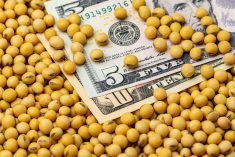Chicago | Reuters — U.S. soybean prices fell on Wednesday after a U.S. trade official said purchase promises were not enough to solve U.S.-China trade issues and that it was too early to predict an outcome to talks between the two countries.
Any deal between Washington and Beijing must include a way to ensure commitments are met, U.S. Trade Representative Robert Lighthizer said Wednesday.
The comments come after U.S. Agriculture Secretary Sonny Perdue said last Friday that China committed to buy an additional 10 million tonnes of U.S. soybeans.
Read Also

Ukraine wheat exports remain low amid Russian attacks on ports, weak demand
Ukraine’s wheat exports remained relatively low in the first half of January amid Russian attacks on Ukrainian seaports and low external demand, data from the country’s grain traders union UGA showed on Wednesday.
“The market just doesn’t know how to trade it,” said Joe Davis, director of commodity sales for Futures International in Chicago. “We’re still waiting on this U.S.-China trade deal and almost daily you get conflicting statements.”
Chicago Board of Trade May soybean futures edged down 1/4 cent at $9.16-3/4 per bushel.
May corn dropped for the third consecutive session, falling 2-1/4 cents to $3.73-3/4 per bushel. It earlier sank to $3.72-3/4, the lowest since Sept. 21.
May wheat fell 1-1/2 cents to $4.66-3/4 a bushel, struggling to rebound a day after the most-active wheat contract fell to its lowest since April 17.
The Chicago market has been hoping for a transfer of export business to the U.S. after heavy sales from the Black Sea. But Russia and the EU are continuing to have strong sales in world wheat markets.
Russia, the world’s largest wheat exporter, said on Wednesday it does not plan to impose restrictions on grain exports.
“The background factor remains that U.S. wheat prices will have to fall to more competitive levels if the U.S. wants to win more export business against Russia and also France, which has lower ocean shipping costs to African and Middle East export markets,” said Michael Magdovitz, senior agriculture commodities analyst at Rabobank.
Dry weather for about six months on Australia’s east coast may curb wheat crop yields for a third straight year in the major exporter, a weather forecaster said.
The U.S. Environmental Protection Agency will probably not be able to finalize its rule allowing year-round sales of higher ethanol blends of gasoline known as E15 by summer, but could compensate by declining to enforce the current summer-time ban, Perdue said on Wednesday.
— Reporting for Reuters by Stephanie Kelly in Chicago; additional reporting by Michael Hogan in Hamburg and Colin Packham in Sydney.


















